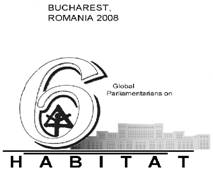

|
6. European Forum
|
Peter Götz MdB
Member of the German Bundestag
Vice-President of the Global Parliamentarians on Habitat
European President of the Global Parliamentarians on Habitat
Speech
Sixth European Forum of the Global Parliamentarians on Habitat
"Good Laws for a better life in cities"
Wednesday, 23 April 2008
Romanian Parliament, Bucharest
Check against delivery!
Vice-Chairman Oltean,
President Segovia,
Minister Borbely,
My colleague, Traian Constantin Igas,
Colleagues,
Ladies and Gentlemen,
On behalf of the Board of Directors of the European Global Parliamentarians on Habitat, I would like to welcome you very warmly. I am delighted that you have come to Bucharest to attend our conference.
Chairman Oltean, we would like to thank you for the Romanian Parliament's willingness to host our conference.
Romania very successfully organised the Nato Summit. I congratulate you on this.
We are particularly grateful for the fact that, only two weeks later, we are able to meet today and tomorrow on the premises of the Romanian Parliament and would like to thank you and the many people who made this possible through their efficient preparatory work.
I should like to say a special word of thanks to our colleague on the Board of Directors, Mr Traian Constantin Igas, for his great personal commitment to organising our conference today and tomorrow.
Ladies and Gentlemen,
Colleagues,
I am delighted that our worldwide President, our friend and colleague Senator Eloy Cantu Segovia, along with our former worldwide president and current President of the Consultative Council, Oscar Lopez Velarde Vega, have come all the way from Mexico to be with us today and play a role in the Sixth European Forum of the Global Parliamentarians on Habitat.
Since the Istanbul conference in 1996, we have been linked with Eloy Cantu Segovia and Oscar Velarde Vega by a friendship of many years and by intensive cooperation on achieving the goals of Habitat. Yesterday, at the meeting of the Board of Directors, we set out important milestones for the future of our parliamentarians' organisation – which we will discuss today and tomorrow.
I should like to welcome our colleagues from Uganda, headed by the Honourable Nalubega Mariam Patience. We are happy that you have come such a long way to join us for deliberations on the challenges we face for the future. Thank you for coming.
And we are pleased to welcome Markandey Rai, Coordinator for Global Parliamentarians on Habitat at UN-Habitat in Nairobi and grateful for his presenting the message of greeting.
He is attending the conference in place of Executive Director Dr Anna Tibaijuka. She very much regrets the fact that she is unable to attend the conference.
We Global Parliamentarians on Habitat are linked with the United Nations, particularly with UN-Habitat, by the committed and constructive implementation of the goals of the Habitat Agenda agreed in Istanbul.
I should like to say thank you for the positive cooperation with Nairobi and with the UN-Habitat office in Brussels.
Above all, though, I should like to welcome very warmly, my dear colleagues, all of you who have come from across Europe to be here today. Many of you are present for the first time. We are pleased to see your interest and happy that you are helping to ensure the success of the Habitat process.
Almost 12 years have now gone by since we in Europe decided to cooperate more closely to help ensure that the Habitat Agenda agreed in 1996 in Istanbul was reflected in national laws.
As in the past, we parliamentarians, as legislators, must continue to exert pressure in our own countries in order to ensure that the goals to which our governments have committed themselves are translated into political action.
Today and tomorrow we not only want to talk about our own work and the progress we have made. We also want to use this conference to engage in discussions with the public, with government representatives, with NGOs and with business representatives on how we can bring about improvements.
Colleagues,
As you know, elections for the European Board of Directors are pending. Some proposals have already been made, but some places on the list have yet to be filled. We would be very pleased to hear about anybody who wishes to get actively involved.
I should like to thank the colleagues on the board for the good and friendly cooperation.
Over the last few years, we have increasingly enhanced the role played by parliamentarians. Together, we have achieved a great deal. But we must work tirelessly to achieve our goals.
Over the last 2 years, we have held six meetings of the Board of Directors, and have also taken part in worldwide events, such as
• the World Urban Forum III in Vancouver/Canada
• meetings of the Governing Council of UN-Habitat in Nairobi/Kenya
• the UN-Habitat Conference on the "State of Safety in World Cities" in Monterrey/Mexico and
Further details can be found in the report.
The Global Parliamentarians on Habitat will also be actively involved in the next World Urban Forum IV, to be held from 3 to 7 November 2008 in Nanjing/China, at which they will be organising a roundtable.
The future of our towns and cities is of the utmost importance to us. It is urban areas which serve as motors for economic growth and for social development. There can be no future without them!
At the same time, however, they act as seismographs for the positive and negative impacts of globalisation.
By the middle of the 21st Century, two-thirds of the world population will live in urban areas. Today, urban areas account for 75% of energy consumption and around 80% of worldwide CO2 emissions. Conurbations are the largest contributors to climate change.
At the UN Climate Change Conference in Bali, participants were confronted with the fact that, for example, the CO2 generated by a metropolis like New York equals the levels produced by the whole country of Portugal.
This message is loud and clear.
We are one world and climate knows no borders.
In cooperation with responsible stakeholders urban areas must act as trailblazers.
Yet, they alone cannot achieve this. Governments and parliamentarians must do their bit. We must help, by developing sustainable laws, to ensure that climate change does not become an irreversible threat.
We need strategies and new instruments, to safeguard cities' economic prosperity without endangering their urban qualities.
Right across the world, ecological challenges are coming to a head in towns and cities:
• climate change,
• traffic emissions,
• lack of empty spaces,
• reduced biodiversity, etc.
In parallel, and to some extent in conjunction with this, social and cultural segmentation is growing: the differences amongst urban areas and urban districts are becoming increasingly pronounced in terms of whether their residents are poor or rich, educated or uneducated, native inhabitants or newly arrived – sometimes even to such an extent as to exceed urban capacities for integration. And there is also the question of people's security.
There is increasing recognition of the fact that sustainable urban development policy must be an all-inclusive project. The "climate-friendly urban regeneration" which is needed will mean significant changes for life in urban areas.
We want to see clean, sustainable and healthy towns and cities. That is why, alongside many other issues, there must be a greater focus in public debates on the questions of
- climate-friendly urban planning
- energy efficiency and
- renewable energies.
We too, the Global Parliamentarians on Habitat, must get involved in this vital process.
One of the ways in which we have made this clear is through the comparative study we commissioned. This study examines the way in which the goals and principles of the Habitat Agenda are being translated into national law in the different European countries.
We are in close contact with the European Commission in order to motivate other European states to get involved with this project, too.
Our colleague on the Board of Directors, Dr Anneke Assen from the Netherlands, has been monitoring this comparative study and has herself played an active role in it.
At our Fifth European Forum in The Hague, and at the World Urban Forum III in Vancouver, she presented the findings of the study.
Yesterday and today, a group of experts headed by Professor Schmidt-Eichstaedt examined in depth the findings of this study.
We will hear more about this at the workshop this afternoon.
In another workshop we also want to look at climate and energy issues and their impacts on urban areas.
Ladies and Gentlemen,
Colleagues,
As you see, it is interesting to get involved in the work of our organisation. We are unlikely to run out of issues to discuss in the Habitat framework. We are part of a dynamic process of worldwide change.
The challenges faced are significant and diverse. It is our duty to find answers to the challenges, to think about solutions and develop good ideas which we as parliamentarians can feed into day-to-day politics and into better legislation. This goal should also be reflected in the "Bucharest Declaration" which we want to adopt.
I look forward to the next two days with you and wish us interesting and informative discussions and deliberations.
Thank you very much!
- Programme (engl.)
- Programm (deutsch)
- Bucharest Declaration - Draft (engl.)
- Erklärung von Bukarest - Entwurf (deutsch)
- By-Laws of the Global Parliamentarians on Habitat (engl.)
- About the Global Parliamentarians on Habitat (engl.)
- Über die Global Parliamentarians on Habitat (deutsch)
- Report on the Work of Global Parliamentarians on Habitat from the European Continent 1996 - 2008
- Bericht über die Arbeit der Global Parliamentarians on Habitat from the European Continent 1996 - 2008
- Rede von Peter Götz, MdB,Vizepräsident der GPH, Europäischer Präsident der GPH
- UN-Habitat
- Grupo Mundial de Parlamentarios para el Habitat
